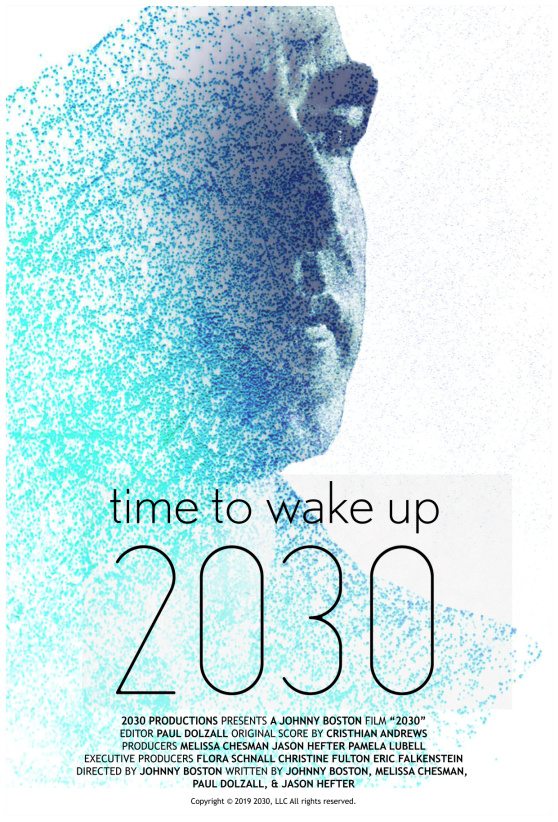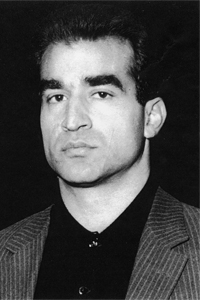 2030, a film about the life (and hypothetical future) of the futurist FM-2030 is a project that my collaborators and I spent many years working to form, fund, and create. By February of 2020, when the film was finally ready to launch into the world, the year 2030, the inspiration for FM-2030’s last name, no longer seemed so far off. 2030 was the year that FM would have turned 100 – he died in 2000 of cancer, and was cryonically preserved – but for FM 2030 was a symbol of an optimistic beginning, not an end. In juxtaposition, the months after 2030’s release felt anything but optimistic, especially as the world began to self-quarantine at home due to the Coronavirus pandemic.
2030, a film about the life (and hypothetical future) of the futurist FM-2030 is a project that my collaborators and I spent many years working to form, fund, and create. By February of 2020, when the film was finally ready to launch into the world, the year 2030, the inspiration for FM-2030’s last name, no longer seemed so far off. 2030 was the year that FM would have turned 100 – he died in 2000 of cancer, and was cryonically preserved – but for FM 2030 was a symbol of an optimistic beginning, not an end. In juxtaposition, the months after 2030’s release felt anything but optimistic, especially as the world began to self-quarantine at home due to the Coronavirus pandemic.
2030 takes place in a present-day scenario where FM is on the brink of returning to life in the 21st Century. Sometimes people who have viewed 2030 ask me why I didn’t go the route of making a traditional bio-doc about FM. Or, if I wanted to make a film set in the present, why didn’t I focus more on the futurists and Transhumanists who are alive and working today? There are two answers to that question. First, I wanted audiences to view FM and his ideas as present and palpable, not as historical artifacts. Second, to me, FM’s ideas still resonate in a deep way, in part due to their breadth, and in part due to my long personal friendship with FM the human being.
I met FM-2030 at ten-years-old, growing up as a Jewish kid in London. I felt like an outsider in at least two ways. First and most obvious, I was one of the few Jewish boys in my social circle. Second, I possessed a wild and undisciplined nature, and the London class system and norms felt incredibly stifling to me. I spent those years searching for other visions of the world. Many of the alternatives were wholly unproductive and led me into trouble, but two of them have stuck with me over a lifetime. The first was the cinema, and the second was the vision of FM-2030.
Just before meeting FM for the first time I encountered the 1930 film “All Quiet on the Western Front.” This incredible masterpiece of filmmaking made me re-evaluate my own prejudices. As a Jewish young boy living in London with a father who lost his house and nearly his mother during the blitz, it was fair to say that I wasn’t fond of Germans. The director Lewis Milestone not only brings you into the world of the young German soldiers of the film but humanizes them in such a way that the audience is right there with them. Seeing this, I knew I wanted to be involved in making films.
And it was shortly after this that I met FM. FM offered me a different lens to regard life; his lens showed a bright future a bit beyond the horizon but within reach. My very first impression of FM was not as a fantastical futurist but simply as one of the very few adults I had encountered who was willing to speak with a ten-year-old as if they were an adult. A man who seemed genuinely curious and engaged when I told him my opinions on the world, regardless of if my opinions aligned with his.
When I got myself into trouble, he tried to help offer paths forward, but without judgment, and without actually telling me precisely what I should do. And most importantly, he offered me hope that the world would evolve to be a better place. The great difference between the world of the past and the world of the future was to be humankind’s belief that we could fix our problems, the belief that nothing was fated, no institution was eternally sacred, nothing was impossible if we set ourselves to it. In short, a radical optimism.
Making 2030 was a challenge in the sense that I wanted to make a film that I thought FM would be proud to be associated with. I believe FM would have been uneasy at best with the idea of a traditional biographical film. It is not that a telling of young FM’s journey would have been uninteresting; on the contrary. FM was born into a large and wealthy Iranian family. His father was a diplomat, FM served his country in the Olympics. The revolution then changed his family’s situation dramatically. In the United States, FM first remade himself as a novelist, weaving existentialist stories. But somewhere along the way, he seemed to decide that radical optimism was a force more likely to create positive change in the world than dark tales that explored societal hypocrisies and shortcomings.
The futurist FM explored the themes of societal problems too – but by focusing on what he thought should be, as opposed to focusing so much on what should no longer be. He often said that our futures (both collectively and individually) were to be more important than our pasts.
FM was a self-described “film-buff,” but in many ways, he was displeased with storytelling in the late 20th century. Apart from cinema’s obsession with glorifying violence, there was one big trope that he wanted to change: The future was almost always portrayed as dystopian. This was doubly the case when technology was involved; if storytelling was to be believed, any revolutions in technology and culture were sure to be fatal hubris, dooming mankind for “playing-god.” FM wasn’t naive enough to believe this style of storytelling was going to go extinct — but he strongly encouraged me and others to find new stories, new tropes, new visions of the future. I was determined to make 2030 reflect that goal.
One criticism of FM that I’ve encountered, in relation to modern-day futurists, Singulatarians & Transhumanists, is that FM’s philosophy, as future-looking as it aimed to be, was still very much a product of its time. Specifically, FM and his ideas were a product of the 1960s and 1970s. And in certain respects this is true. FM’s ideas about free-love, gender-roles (or lack thereof), ethics, anti-imperialism, vegetarianism, and an egalitarian planet all dovetail nicely with the green movement and the hippies of the era. And even technologically, the extent to which FM sometimes focused on space-travel was a product of the heyday of the Space Race and Apollo program, where it seemed as if human colonization of the solar system was a simple matter of years away.
But in a way, this is precisely why I wanted to bring FM to the audiences of the 21st Century. Futurism and Transhumanism, to me, is so much more compelling when it is about more than just living indefinitely and admiring fancy technology. People sometimes debate if Transhumanism is truly a philosophy or just a set of goals and ambitions. I won’t wade into that here except to say that to me, FM himself always seemed like a philosopher. More than that, he seemed to be a human who aimed to live by his philosophy. There is no question – he deeply wanted to live forever. But he also had the audacity to question everything else about the status-quo, to try to search for a world that was radically less oppressive than our own.
My hope is for 2030 to challenge audiences not just as it relates to the specific themes of the film, but to examine their own belief systems. If we can accomplish this, we will move one step closer to the rapidly approaching 2030, which I hope will be a magical time, a time that FM would be happy to come back to.
About the Author:
 Johnny Boston is a filmmaker and creative director who grew up in Europe and is now living on the East Coast. To see more of Boston’s videos please check out the Galactic Public Archives’ channel on YouTube or visit 2030thefilm.com
Johnny Boston is a filmmaker and creative director who grew up in Europe and is now living on the East Coast. To see more of Boston’s videos please check out the Galactic Public Archives’ channel on YouTube or visit 2030thefilm.com

 FM-2030, a noted author, lecturer and consultant to business and industry died on July 8, 2000. FM was born with a conventional name but changed both his first and last names to reflect his beliefs and his confidence in the future. As he explains, “conventional names define a person’s past: ancestry, ethnicity, nationality, religion. I am not who I was ten years ago and certainly not who I will be in twenty years. The name 2030 reflects my conviction that the years around 2030 will be a magical time. In 2030 we will be ageless and everyone will have an excellent chance to live forever. 2030 is a dream and a goal.”
FM-2030, a noted author, lecturer and consultant to business and industry died on July 8, 2000. FM was born with a conventional name but changed both his first and last names to reflect his beliefs and his confidence in the future. As he explains, “conventional names define a person’s past: ancestry, ethnicity, nationality, religion. I am not who I was ten years ago and certainly not who I will be in twenty years. The name 2030 reflects my conviction that the years around 2030 will be a magical time. In 2030 we will be ageless and everyone will have an excellent chance to live forever. 2030 is a dream and a goal.”